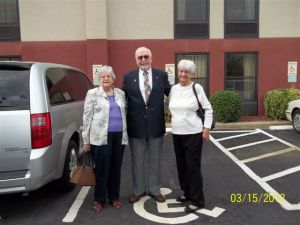I hate New Year’s Day! Did I say that too harshly? Let me put it differently. Were I to choose my least favorite holiday, it would be New Year’s Day.

For some, turning the calendar page presents opportunities, a clean page in life, or a new start. Only the Tournament of Roses parade and a festive pork and sauerkraut dinner have saved the day for me.
Resolutions are in mode January One. I am not geared to timeless commitments. So I developed an alternate plan.
Why? My reasons may not sound rational to those who enjoy this holiday, but I do have them, at least four. Number one, I’m not a sports fan. One football game per week is more than my quota. When they are telecast back-to-back and end-to-end, I have reached my participation limit. Turn off the TV. Ha Ha. How could I do that when other family members sit in the cheering section?
My second reason is that we have come to the beginning of a new year. That’s the general idea, you say. But, it also means that another one has passed into history. Just yesterday, we ended the 90’s and now we are into the 14’s. Oh, I am grateful to the Lord for the privilege to live through a year and enter a new one. I just wish time would slow down a little bit.
Thirdly, the time has come to undeck the walls, store away the silver bells and untrim the evergreen. “White Christmas” has turned into January slush.
Lastly, but certainly not leastly, I am being pressured into doing something with this day. Not just relax and enjoy it, like the Fourth of July.
Everywhere, I hear this message. It’s the start of a new year and therefore, a new beginning. Time to make a reassessment of goals and objectives. Time to make an important list of resolutions.* What should be the order of my events, or what should be my priorities? What am I going to do with the twelve months, which are before me?
What indeed? I will tell you that, if you will stop the barrage of questions. I resolve not to resolve! Most resolutions never make it past February. Mine would not even make it that far.
One year my Mother-in-law wrote, “Well, I guess I have already broken my New Year’s resolution. I had vowed I would write 2 letters a day until I got caught up. So here I am January 19, just getting started.”
And she’s not alone. I read that only 40% of the people who determine to quit smoking on New Year’s Day get past the first 24 hours without a cigarette.
As I said at the beginning, instead of resolving to do or not do something for the next year, I developed an alternate plan. I have started my own tradition of doing one thing on New Year’s Day. This project might take from one to four hours. It gives me an excuse to sit in the family room while certain sports fans cheer a game.
Then, while savoring my holiday meal I feel a sense of accomplishment rather than apprehension about how long my resolves will last.
I have found that New Year’s Day is a good time to:
1. Start or finish a project. One year, I was appointed to the program committee of our women’s society. It was also the same year in which the president decided, in the interest of saving money, to have the program books made by the society rather than send them to the printer.
Since I had the computer, I did the setup of the books. Many hours were spent in the fall aligning copy and making sure the correct pages were back to back. Then it was time to print, cut, paste and staple–more hours. I have appreciated the printers ever since, even if they do “charge a lot of money.”
By December, the committee had prepared enough books to give to each member; however, the president needed more for county distribution. New Year’s day became a perfect time to finish that project.
2. Sew a button. I hate mending. That can never be said too harshly. Items in need of repair stack up in a basket in my laundry room and remain there for weeks or even months. One year, I looked at a skirt I liked to wear but did not, because it needed a button. I made up my mind to sew it and other items as my project.
3. Schedule my calendar. I don’t know whatever happened to those lazy, hazy days of summer or winter doldrums. They have not been a part of our lives for several years. Now, I find I have to begin to organize time and activities from day one.
4. Plan a January dinner. One year, my former professor visited a local Bible college to conduct a mission’s seminar. Several of his former students were also in the area at the time. I came up with an idea to have him come to our home as guest of honor at a dinner. With all of the holiday rush, when to plan the dinner and invite the others became a problem. So on New Year’s Day, I sat down and planned the menu, chose table decorations and looked up telephone numbers and addresses for the other invitations. In a couple of hours, I had the dinner pretty well organized.
5. Write a thank you. I used to look forward to a few weeks of hibernation in winter. This was a time to paste photos in albums, sort through last year’s letters, or just to rest before the activities began to roll again. It was also a time to write thank you notes for Christmas gifts received. Or, answer notes written in Christmas cards. Since we no longer hibernate, I have to catch note-writing time where I can.
6. Organize a drawer. At the beginning of one year I had a virus and cold. It was making the rounds in the family and everyone felt a bit edgy. I was glad for the day off to relax and get well, however, I still wanted to do something that would not be too strenuous. While I was in my kitchen, I remembered a drawer that I had been promising to clean. I decided that this would be just the day to do it.
As I cleaned, I found an outdated calendar and began to toss it into the wastebasket. On the other side, I spied a Scripture verse: “Come unto me, all ye that labor and are heavy laden, and I will give you rest.” (Matt. 11:25) What perfect words for my aching body and congested mind.
7. Claim a Bible verse. During the month of December, I begin to look for a special Scripture verse that I can take with me into the New Year. In my daily Bible reading I will often consider appropriate verses.(Job 32:7) Sometimes, however, I have found that verse through a sermon in church or a lesson in Sunday school class. I like to read the verse on New Year’s morning and at various times to claim its promises for all the unknown 364 tomorrows.
8. Fast with Prayer. Our pastor often recommends the first Sunday in January as a good day to fast. After all of the holiday goodies I have eaten, I am all for it. I know better than to think I can abstain from desserts for weeks or even days.
But, I can at least stop eating for one day or half a day. Fasting and praying is a positive experience. I have seen several spiritual victories as a result of a weekly fast day.
9. Take a walk. I never commit myself to a long-term exercise program, even though I need one. I can, however, take a walk on New Year’s Day. One year we used this day not only to take a walk, but to also trace genealogy. We walked around several cemeteries copying information from ancestor gravestones.
This generated the start of a “roots” searching project.
10. Pot a plant. Start work on income tax.
I resolve to enjoy the day!
–S–
* The tradition of New Year’s Resolutions can be traced back to ancient Rome. On the first day of the year, Romans looked back to what had happened during the past year and thought of what the coming year might bring.
To mark the beginning of the New Year, they gave each other gifts including branches of bay and palm trees. These gifts signified new beginnings or “turning over a new leaf,” and were the forerunners of our annual resolutions.





